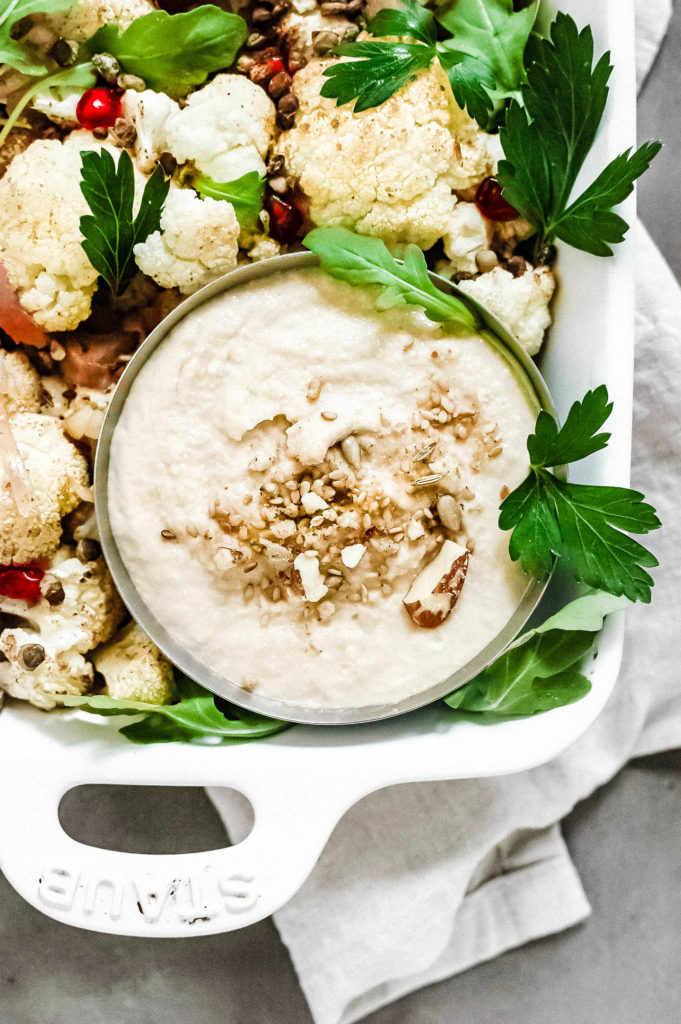
Recently I’ve been absolutely obsessed with making Mediterranean inspired food. There’s just something about spiced, crispy, nutty cauliflower and garlicky lemon tahini that goes together like nobody’s business, and adding in a crunch factor with the sprouted lentils and toasted dukkah? HECK YES.
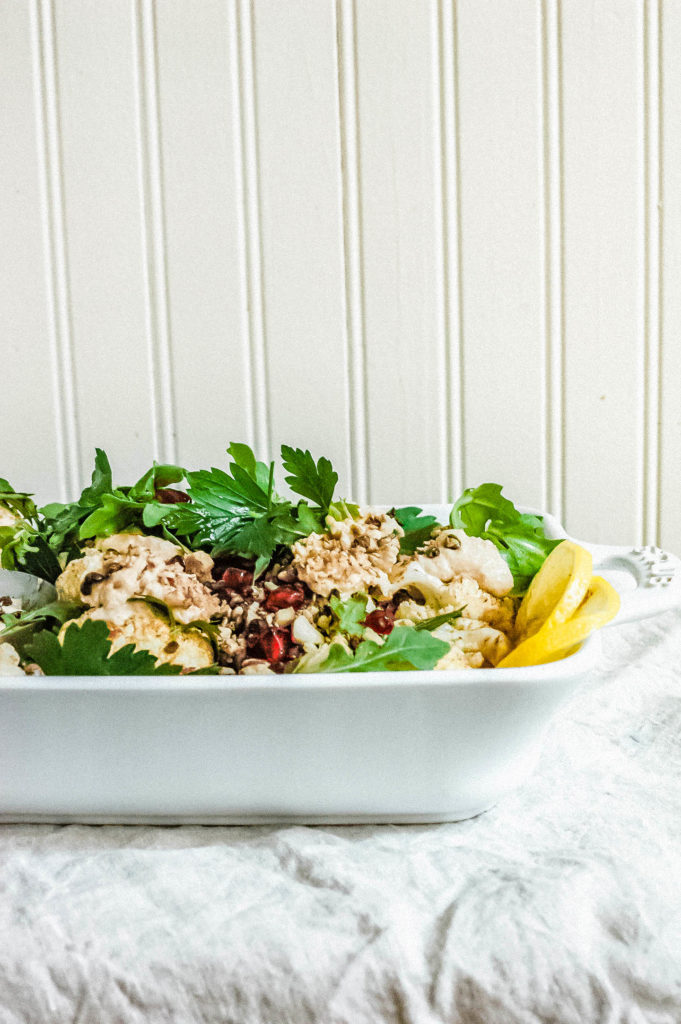
Cauliflower is one of my favourite veggies on earth… when prepared right. It makes for a versatile blank canvas that goes well with many different styles of cooking, and can be found local, organically/biodynamically grown and fresh at your farmers’ market, or even grown at home. Roasting it until it gets crispy is one of my favourite ways to consume it, and I can’t get over the spice combination here—cumin and lemon are particularly incredible together. The dukkah adds a nutty contrast, inspired by traditional Egyptian blends.
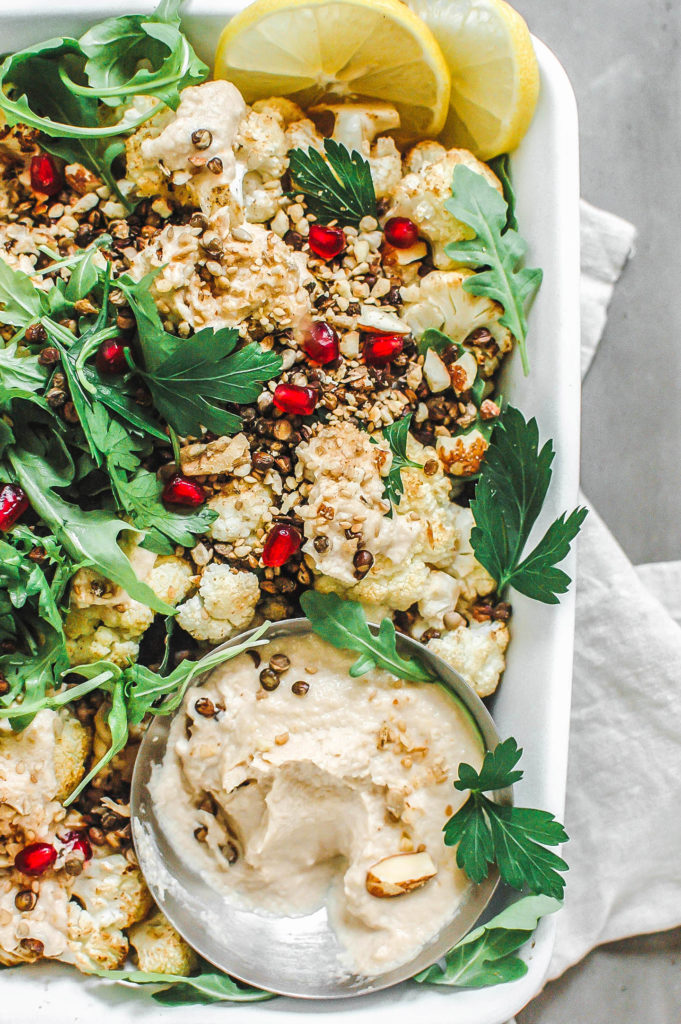
Tips to make this roasted Mediterranean spiced cauliflower toss with lemon tahini dressing & crispy sprouted lentils:
- Soak, drain and sprout those lentils for 24-48 hours in filtered or spring water before preparing this in order to remove the antinutrients and activate them (sorry, but this is a must). It only takes a few minutes to drain and change the soaking water in the morning. If you have no time for that, you can omit the lentils, if you like. Click here for a dedicated sprout jar that has a stainless steel screen lid for easy drainage, I use mine for all of my beans, lentils, nuts, seeds, and sprouts.
- Roast the cauliflower and shallot mixture on a large sheet pan lined with unbleached biodegradable parchment paper, separately before you roast the lentils. The lentils only take a brief 8 minutes to become crispy, and they would overcook if combined with the cauliflower mixture, which takes much longer.
- You can roast the cauliflower as long as you like to get it as crispy as you want. I roasted it for 20 minutes all in one go for the photo, but if you prefer it suuuper caramelized (…yum), roast it for 15 minutes, remove it and toss, then roast it for another 10 minutes, remove it and toss again, then roast it for another 10 minutes.
- For the cri$piest cauli you can get, make sure not to overlap the cauliflower pieces on the roasting tray or you won’t get those crispy bits (my fave part). Try not to leave the florets overlapping on the tray, and cut them small enough so that they can all be spread out on the hot tray and cook evenly.
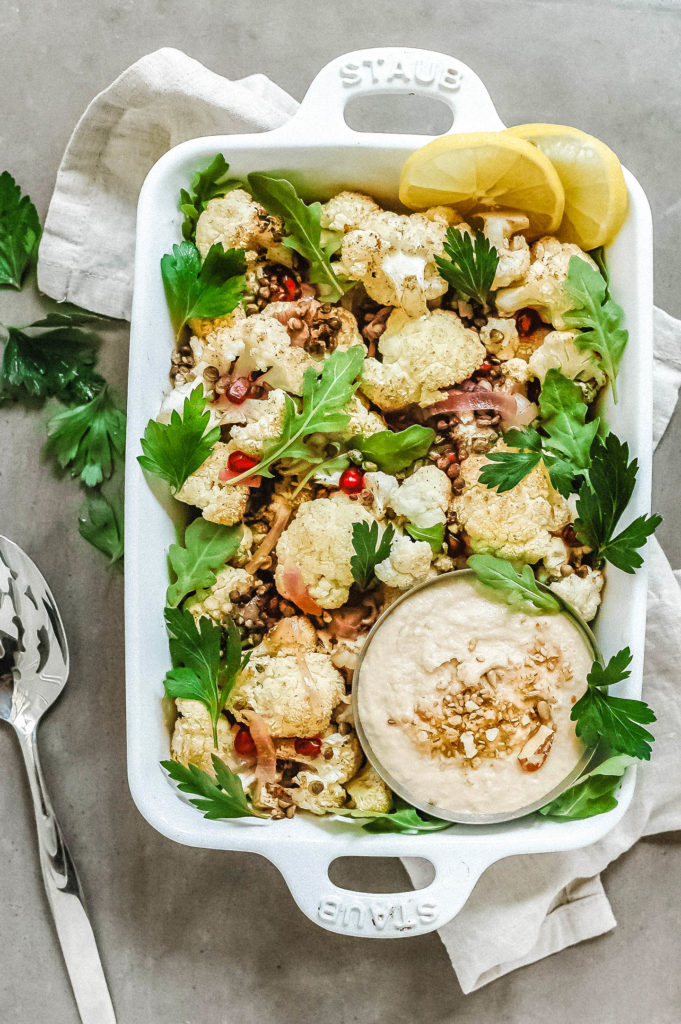
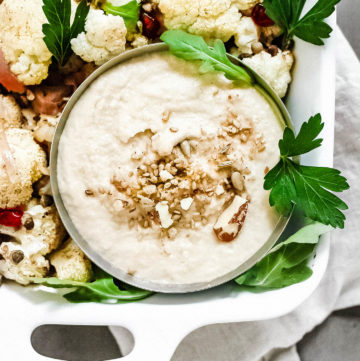
Roasted Mediterranean Spiced Cauliflower Toss with Lemon Tahini Dressing, Crispy Sprouted Lentils & Toasted Dukkah
Ingredients
Toasted dukkah ingredients (makes extra)
- 1/2 cup organic walnuts ideally activated
- 3 tbsp organic almonds ideally activated
- 3 tbsp organic sunflower seeds ideally activated
- 4 tbsp organic white sesame seeds
- 1 tsp organic fennel seeds
- 1/2 tsp organic ground cumin
- 1/2 tsp organic ground coriander
- 1/8 tsp organic cayenne
- 1/4 tsp sea salt
Cauliflower salad ingredients
- 1 head organic medium cauliflower, cut evenly into small florets
- 2-3 organic shallots, finely sliced
- 1 tbsp + 2 tsp extra virgin organic olive oil
- 2 tsp freshly squeezed organic lemon juice
- 2 tsp organic ground cumin
- 1/2 tsp organic ground coriander
- 1/2 tsp organic chili powder
- 1/2 tsp organic caraway seeds
- sea salt and organic black pepper to taste
- 1/3 cup sprouted organic French lentils
- 2 cups organic arugula
- 1/3 cup organic pomegranate seeds optional
- organic lemon slices and/or organic flat leaf parsley to garnish
Lemon tahini dressing ingredients
- 1 clove organic garlic, grated with a microplane
- 1/3 cup organic tahini
- 2 tbsp filtered water
- 2 tbsp freshly squeezed organic lemon juice
- 2 tsp organic apple cider vinegar with the 'mother'
- 1 tsp organic maple syrup
- sea salt and organic black pepper to taste
Instructions
- Preheat the oven to 400 F (200 C). Line a baking sheet with unbleached, biodegradable parchment paper or prepare a carbon steel baking tray.
- Make the dukkah. In a dry skillet, toast the walnuts, almonds and sunflower seeds on medium high, stirring regularly until they turn fragrant and slightly golden brown, about 5 minutes. Transfer to a small bowl. Place the sesame seeds in the same skillet and return to heat on medium until they start to pop and turn golden brown in colour. Quickly transfer them to the small bowl with the toasted nuts. In a food processor, combine the toasted nuts, seeds, fennel, cumin, coriander, cayenne and sea salt, and reduce to a crumble that is dense in texture, but not too fine. Remove and set aside in a storage jar.
- Make the salad. Place the cauliflower florets and shallots combined on the baking sheet. Drizzle with the olive oil and lemon juice, and season with the cumin, coriander, chili, caraway, salt, and pepper. Toss them right on the baking sheet to coat them with the spices.
- Slide the baking sheet in the oven, and roast for 20 to 25 minutes or until cauliflower is quite browned to your preference.
- While the vegetables are roasting, make the lentils. Bring a medium saucepan of filtered water to a boil. Drop in the lentils with a big pinch of salt. Bring it down to a simmer for about 20 minutes or until lentils are tender. (Skip this step if you've sprouted your lentils).
- Meanwhile, make the tahini. In a small bowl, combine the garlic, tahini, filtered water, lemon juice, apple cider vinegar, maple syrup, salt and pepper. Whisk the mixture with a fork until it has a smooth, creamy texture. Set aside.
- Once the vegetables are done, remove the baking sheet from the oven and transfer the roasted vegetables to a serving bowl. Remove the lentils from heat and drain (if you boiled them), and transfer the lentils to the same baking sheet. Slide the baking sheet with the lentils back into the oven to roast for a brief 8 minutes at 400 F (200 C). Remove from the oven, and using a stainless steel or silicone spatula to lift them up from the sheet, sprinkle the lentils on top of the cauliflower and toss the mixture evenly with the arugula and pomegranate seeds.
- Serve the roasted cauliflower toss hot with the tahini drizzled over top, a big pinch of toasted dukkah sprinkle, and some fresh lemon wedges on the side, if you like.
Notes
- There will be a lot of dukkah left over for all of your sprinkling needs. Store it in a tight lid jar for 2 weeks as a topping for salads, soups, pasture raised meats, roasted vegetables, or any other dish.
- When making the tahini, you can potentially make the garlic’s nutritional value and healthful, anti-cancer compounds more bioavailable by grating it at the very beginning to allow the garlic to be exposed to the air for about 6-10 minutes (or more). (source)
- Nutrients in plants are not always easily digested, even if 100% organic/biodynamically grown. Sprouting the lentils to reduce their antinutrients is imperative to avoid ending up with a nutrient net negative and digestive issues (plus it softens them up)! This is one of the many ancestral methods of preparation you can use to maximize the nutritional profile and benefits while minimizing the harm of all of the delicious produce you consume. One example is in Chinese medicine where sprouted foods were used for over 5,000 years to cure ailments. If you do sprout your lentils for this recipe, boiling them is entirely optional (I do it anyway)—you can just pop them right into the oven directly after transferring them from their sprouting vessel.
